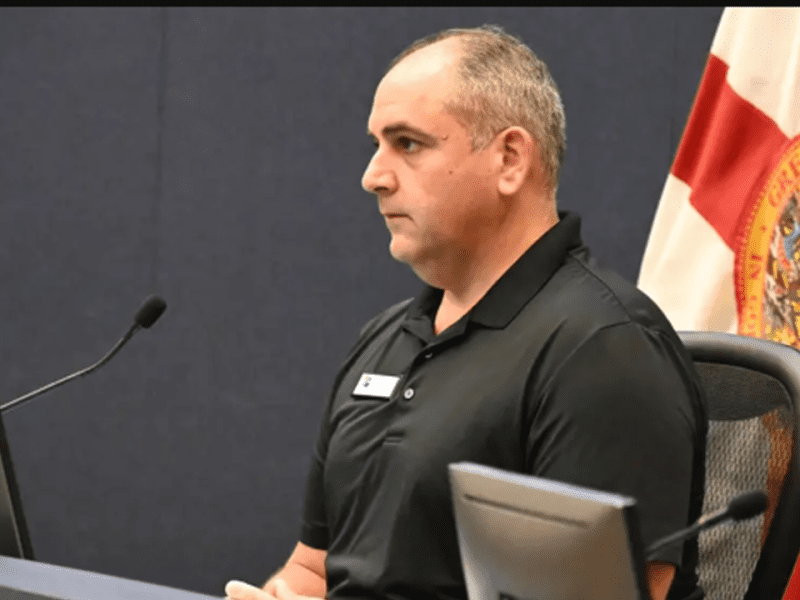
‘A very sad, sad case’: How a system designed to protect children kept a 13-year-old girl in detention for a crime she didn’t commit
South Florida Sun Sentinel | By Chris Perkins | February 22, 2022
Two months after being arrested and spending nearly two weeks in a juvenile detention center, charges were dropped against 13-year-old Nia Whims.
Whims, a seventh-grader, was accused of using Instagram to make a written threat to kill a teacher and a 12-year-old classmate, and blow up their school. After Pembroke Pines police investigated further, they discovered the 12-year-old girl impersonated Whims by creating fake Instagram and email accounts in her name. Now, charges have been filed against the 12-year-old.
But the big question is how a justice system designed to protect children failed to protect a child who consistently maintained her innocence.
The identity theft was part of ongoing bullying issue the school didn’t address, according to Whims and her mother, Lezlie-Ann Davis.
“Someone is bullying you,” said Jaime Aird, the family’s criminal attorney, “and then you use the school and you use the police to continue the bullying.
“I can only imagine what that family is going through.”
The family says it’s traumatized.
“It’s not just frustrating, it goes deeper,” Davis said. “It’s emotional.”
Whims is undergoing counseling because of the experience, including the part where someone in the juvenile detention center threaten to stab her over a piece of chocolate. A lawsuit was filed Feb. 15 on behalf of Whims and her mother against Renaissance Charter School and Meta, the parent company of Instagram. The Pembroke Pines police also will be added as defendants, according to Marwan Porter, the family’s civil attorney.
Police admit Whims didn’t send the threatening messages, but they say it’s inaccurate to classify it as a wrongful arrest. The arrest was justified, police say, because Whims and Davis chose to “exercise their rights and did not cooperate with investigators,” according to Capt. Adam Feiner, spokesman for the Pembroke Pines police.
Porter said there was no justification for putting his client in handcuffs.
“Had they done a proper investigation this wouldn’t have happened,” he said.
Police might have felt pressure to make an arrest because the case involved violent threats against a school and students, according to Phillip Sweeting, a retired deputy chief for the Boca Raton Police Department who was not involved in the case.
“Outwardly they’re not under pressure,” he said, “but internally they probably are for various reasons, even for political reasons to some extent.”
How it happened
On Nov. 17, Davis withdrew Whims from Renaissance because she said a group of students, including the 12-year-old, was bullying Whims. On Nov. 18, the Instagram threats were sent, saying violent actions would be carried out at the school the next day. On Nov. 19, Renaissance went on a partial shutdown (code yellow) while Pembroke Pines police went to the school and investigated the threat.
After making sure the school was secured and there was no imminent threat, police interviewed the 12-year-old. They also consulted a school administrator who said Whims had “multiple disciplinary issues,” according to the police report. Davis denied that characterization; she said her daughter’s only issues were because of her responses to the bullying.
Police went to Whims’ house that afternoon and she denied sending the threatening messages. Davis admits she didn’t support her daughter 100% initially, and says she feels badly about that.
Regardless, after Whims denied involvement, their attorney at the time told Whims and Davis, via telephone, not to answer any more questions.
Upon leaving the house, police took an iPad Whims admitted using. They also handcuffed and arrested Whims.
Whims spent so much time in the detention center, her current attorneys say, because she was detained six days before Thanksgiving, and when a judge ordered a psychiatric evaluation, a normal requirement, the county was short-staffed.
Police don’t think they erred by making the arrest. They said it was justified based on their investigation and Whims’ lack of cooperation.
Black and blue
Minorities are sometimes reluctant to cooperate with police, thinking it could make their situation worse.
Bob Jarvis, a law professor at Nova Southeastern University who isn’t involved in the case, said the girl and her mother, who are Black, could have done more.
“Non-cooperation does not equal guilt,” he said. “But if they had nothing to hide, one possibility would have been to try to work with the police.”
However, Jarvis said that aspect of the case is filled with nuance. He said it’s possible Whims and Davis had a negative perception of police. Sweeting said it’s possible police had a negative perception of Whims and Davis.
Whatever the case, criminal attorney Aird said police seemed determined to arrest the 13-year-old.
“Say, for example, she had cooperated and done everything they asked her, and they never found anything, they would have still arrested her,” he said. “They would have said, ‘You deleted the messages.’
“There’s nothing I see they could have done that could have prevented this arrest from happening.”
Civil attorney Porter, who wondered whether this would have happened to a white girl at a private school, thinks there was a racial aspect, whether intentional or unintentional, at all levels.
Pembroke Pines police say a major reason for the arrest was Whims and Davis invoking their right to remain silent, saying if they had fully cooperated “additional evidence may have been identified before either subpoenas were presented or search warrants were applied for.”
Under pressure
The police reaction to make an arrest in situations involving violent school threats could be a result of the Marjory Stoneman Douglas tragedy and other acts or threats that have killed or injured children, Sweeting said.
And kids who have been bullied are considered prime candidates for carrying out such acts.
About 20% of kids between 12 and 18 years old report being bullied, according to Dr. Kasi Patterson, a licensed clinical psychologist at Behavioral Health Associates of Broward.
“I think there is an increase in cyber-bullying that I’ve noticed in my experience,” he said.
Patterson said kids who are bullied can have feelings of isolation, despair, exclusion, and rejection, which could lead to anxiety and depression. He said he hasn’t noticed a gender difference in bullying.
Patterson declined to say what Renaissance should have done in this situation. But he thinks dealing with bullying requires creating a zero tolerance atmosphere for bullies, and responding to victims with care and compassion.
Police say they acted lawfully at the time they arrested Whims.
“Police officers were operating under exigent circumstances and in accordance with the Marjory Stoneman Douglas Act,” Feiner said, adding the arrest was “based upon available evidence, witness statements and the recommendation from the Broward State Attorney’s office, who worked in consultation with investigating officers.”
Police said they’re no longer operating under exigent circumstances because there’s no threat, and the 12-year-old has been charged. Sweeting suspects police are saying that to justify hasty actions.
“They used exigent circumstances, that excuse, on the 13-year-old because I can’t arrest you from your house without a warrant,” Sweeting said.
Whether police should have investigated Whims’ claims of innocence after her arrest is a point of contention.
Police didn’t obtain a subpoena or search warrant to determine the IP address where the threats originated until December.
The subpoena should have been obtained sooner, according to attorney Bruce Raticoff, who isn’t involved in the case.
“It’s very simple,” Raticoff said. “This was a flawed, incomplete, short-sighted police investigation.
“They have the ability to subpoena records, they have the ability to get IP addresses and see the locations of those IP addresses. So, it seems to me it’d be a very simple thing to get the IP address and see if it came from the 13-year-old girl.”
Sweeting said police initially did the right thing by checking with the Broward State Attorney Office before making an arrest. He said if there’s no arrest and the teenager had committed a crime, it could be a bad situation for all involved.
“Probably the prosecutors themselves were under, quote, political pressure, especially with schools, to get the bad guy off the street,” he said.
Responsibility
Finding which entity could have or should have acted to stop Whims’ bullying, identity theft, arrest and detention is difficult.
“The teacher passes it on to the police department,” Aird said. “The police department passes it on to the courts, to the State Attorney Office, the State Attorney Office passes it off to the judge, the judge then passes it off to a psychiatrist to do an evaluation.”
Porter said one goal of the lawsuit is policy change — not just for Whims’ sake.
“It’s a bigger issue than just her,” he said.
Aird said Whims has been traumatized by everything facet of the situation.
“She was arrested over something she never did,” he said.
“It was a very sad, sad case.”





